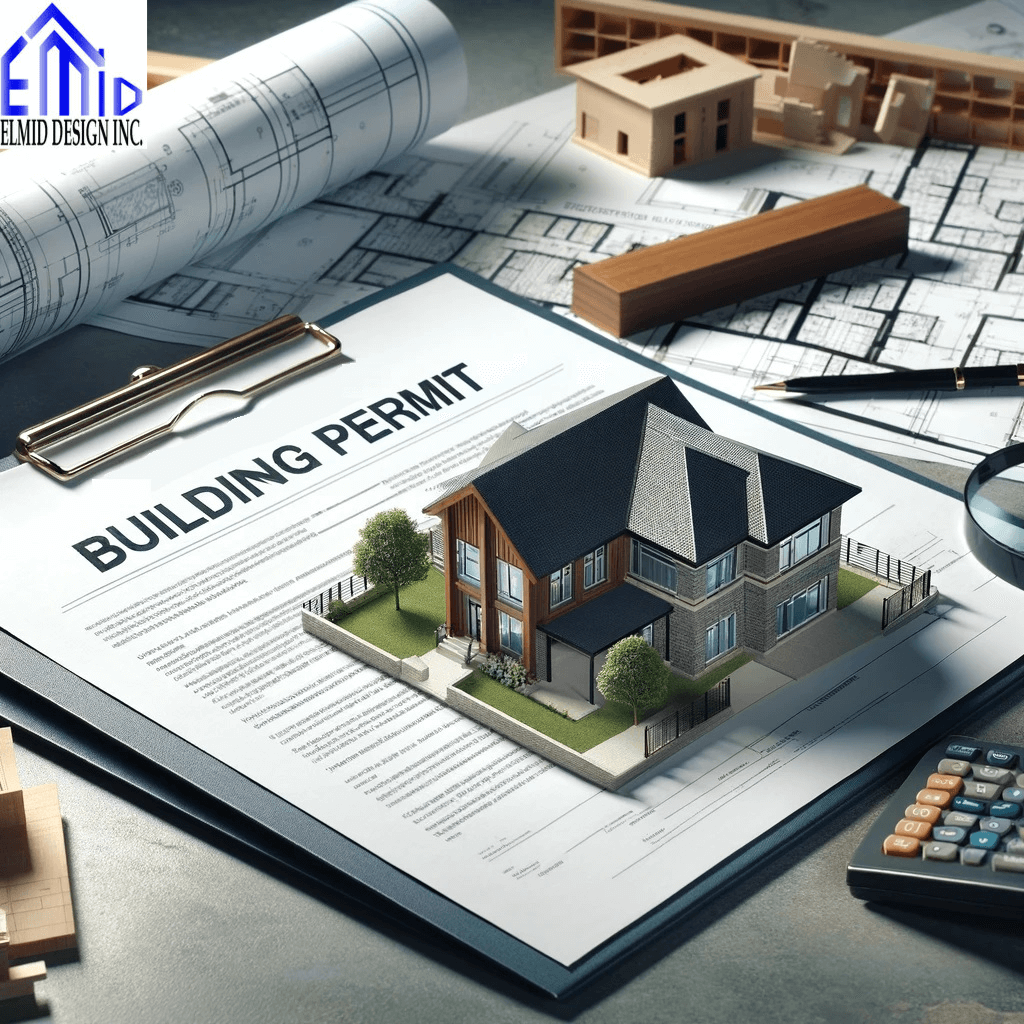Getting an Etobicoke building permit isn’t just a formality. It’s a legal requirement that protects homeowners, contractors, and even neighborhoods. Whether you’re planning a basement renovation, building a garage, or adding a second unit, this guide simplifies the permit process. We’ll break down everything from when you need a permit, what paperwork is required, where to submit, and how to avoid costly delays. If you’re in Etobicoke and ready to build or renovate, keep reading to avoid fines and make sure your project follows the law.
Key Takeaways
Etobicoke building permits are handled by the City of Toronto.
All structural changes and new construction need a permit.
You can apply online or by email with the right documents.
Inspections are mandatory during and after construction.
Hiring licensed professionals like Elmid Design Inc speeds up the process.
Building without a permit can lead to penalties or stop-work orders.
When Is a Building Permit Required in Etobicoke?
You need a building permit in Etobicoke if your project changes the structure of a home or commercial building. This includes building a new home, adding a second story, finishing a basement with a new entrance or plumbing, or constructing a deck higher than 24 inches. Detached garages, sheds larger than 15 square meters, and major plumbing or HVAC upgrades also require permits. Interior cosmetic work like painting or flooring doesn’t, but zoning bylaws still apply. Always confirm your specific project with the city before you begin. Failure to obtain a permit can cause legal problems.
Why You Should Never Skip a Permit
Skipping the permit might feel faster, but it can trigger huge setbacks. Without one, inspectors can halt your work, fine you, or force you to undo construction. Unpermitted work also causes problems during home sales or insurance claims. Getting a permit shows your project follows building codes and safety rules. It protects your investment and ensures contractors are doing the job right. Building without a permit is never worth the risk. Always consult a certified professional like Elmid Design Inc to help you stay compliant.
Who Issues Etobicoke Building Permits?
All building permits for Etobicoke are issued by Toronto Building Services, a department under the City of Toronto. Etobicoke doesn’t have a separate process or office. That means all applications, payments, and inspections go through the same centralized system as other Toronto districts. Toronto Building makes it easier for residents and builders to follow one consistent set of guidelines. You can submit your application online or through email. For questions or help, contact the city or work with a licensed engineer familiar with city processes.
What Documents Are Needed for a Building Permit?
You’ll need clear and complete documents when applying. This includes architectural drawings, site surveys, structural plans, HVAC and plumbing layouts, and energy compliance reports. All documents must meet Ontario Building Code standards. You’ll also need a completed “Application to Construct or Demolish” form. Missing or incorrect paperwork causes delays or rejections. If your project involves trees, heritage sites, or special zoning, extra documents may apply. To avoid problems, Elmid Design Inc can help you gather, review, and submit the correct files for your permit.
How Much Does an Etobicoke Building Permit Cost?
Permit fees vary based on the type and size of your project. For example, a residential addition costs about $17 per square meter, and HVAC permits start at $250. Plumbing-only permits usually cost less. The city charges a flat fee for detached structures like garages and applies additional unit-based fees when adding separate apartments. After reviewing your application, the city sends an invoice. Most applicants pay by credit card or certified cheque. Missing a payment delays the process. Elmid Design Inc reviews every detail to make sure no required fee gets missed.
How Long Does the Permit Process Take?
Small residential permits are reviewed in about five to ten business days. Medium-sized projects like additions or multi-unit conversions take closer to fifteen days. Complex builds or commercial projects can take twenty days or more. Delays often come from missing documents or zoning issues. You’ll speed things up by hiring experienced engineers who know the process. Elmid Design Inc, a firm with a PEO certificate of authorization, can reduce wait times by submitting complete and accurate files the first time.
Understanding Zoning in Etobicoke
Even with a building permit, your project must follow zoning bylaws. Zoning controls things like setbacks, height, lot coverage, and building use. If your design doesn’t comply, you may need a variance through the Committee of Adjustment. This adds time and cost. Zoning reviews are part of the permit process. If you’re unsure, request a zoning check before applying. A firm like Elmid Design Inc can evaluate your plans for zoning compliance and help adjust them to avoid rejection.
What Happens After You Apply?
After you submit your application, city staff reviews your documents to check zoning compliance, building code alignment, and applicable laws. If everything meets the requirements, the city approves and issues the permit. If your file has errors, the city sends comments, and you must revise and resubmit. Once you receive your permit, begin scheduling inspections during construction. Inspectors visit the site to check key stages like footing and framing. You must book a final inspection after the work finishes to officially close the permit file and complete the process.

Inspections Required for Every Etobicoke Building Permit
Once you receive a permit, you must complete inspections at each construction stage. These inspections confirm that your work meets building code requirements. The city provides a clear list of inspection stages, including footings, foundation, framing, insulation, plumbing, and the final walkthrough. You need to schedule each inspection at least two business days in advance using your permit number. If you miss one or fail it, inspectors will stop the work until you fix the issue. City staff can request full access to your site. When Elmid Design Inc manages your permit, their team ensures every inspection runs smoothly and passes without delays.
How to Schedule and Pass Your Final Inspection
The final inspection officially closes your building permit. This step confirms that the completed work meets safety and code standards. If you skip it, the city keeps your file open, which can delay refinancing or property sales. Once you complete construction, schedule the inspection without delay. If the inspector notices any issues, correct them right away before asking for a follow-up. The inspector may request as-built drawings or updated photos to confirm compliance. After passing all checks, the city updates your permit status and marks it complete in the records. Always check with your engineer to ensure readiness before you book the final visit.
What Happens If You Skip the Permit Process
Building without a permit in Etobicoke leads to serious consequences. Inspectors can stop the job, issue violation notices, or order demolition of non-compliant work. You may also face fines and legal costs. This applies even to contractors acting without the owner’s knowledge. If discovered later, the city can demand that unpermitted work be legalized retroactively. That process involves extra fees, reviews, and sometimes undoing parts of the project. To avoid future risks, always confirm if a permit is needed before starting. Professional firms like Elmid Design Inc prevent these issues from the start.
How to Avoid Common Mistakes in the Permit Process
Many homeowners submit incomplete applications, causing delays or rejections. Common mistakes include missing floor plans, outdated surveys, unclear plumbing layouts, or incorrect zoning data. Others mislabel documents or send files larger than the city’s 25 MB limit. Even small errors delay approval. Projects that seem minor may still trigger permit or zoning rules. If your application lacks detail, city staff won’t proceed. To stay on track, use engineers who know the system. Elmid Design Inc prepares each file according to city expectations, avoiding issues that waste time and money.
Why You Should Hire Licensed Professionals
Designing a code-compliant structure is not something most homeowners can do alone. Licensed professionals understand structural loads, mechanical codes, and zoning limits. Their drawings follow city guidelines and anticipate what examiners will flag. They handle revisions, resubmissions, and communication with the city. Without their help, applications often stall. Firms like Elmid Design Inc go further by offering full project management for permits. They know how Toronto Building reviews files and how to present projects clearly. Using experts means fewer errors and faster results, which saves you stress and cost.
How to Check Your Building Permit Status Online
Once submitted, you can track your permit online using the City of Toronto’s Building Application Status portal. Enter your address or file number to see updates. Statuses include received, in review, issued, revisions required, or closed. If nothing shows up, the file may not be active yet. Some older permits also may not appear online. If there’s a delay, check with the assigned examiner or ask your engineer for updates. Elmid Design Inc tracks permit timelines closely and provides clients with real-time progress updates during every step.
Handling Zoning Conflicts During Your Application
Zoning conflicts can derail your project fast. If your structure exceeds height, size, or location limits, the city may require a minor variance. This adds months to your timeline. You must apply to the Committee of Adjustment, notify neighbors, and attend a public hearing. Projects near ravines, heritage buildings, or environmentally sensitive lands face even more scrutiny. Before applying, have your engineer review zoning bylaws and make changes early. Elmid Design Inc performs these checks at the start, adjusting layouts and setbacks to fit city requirements and avoid conflict.
When You Need a Structural Engineer
Any project involving load-bearing walls, foundations, or framing changes needs a structural engineer. Their job is to calculate loads and design reinforcements so the building remains safe. The city requires their stamped drawings to approve structural work. Without them, your permit will be rejected. Engineers must be licensed by PEO. Elmid Design Inc holds a certificate of authorization and provides detailed structural designs for new builds, additions, and complex renovations. Their plans are accepted by the city and help pass inspections without delays or added costs.
Understanding Legal Non-Conforming Structures in Etobicoke
Some existing buildings or additions follow outdated zoning bylaws and no longer meet current regulations. The city classifies these as legal non-conforming structures. They keep their legal status as long as you avoid making major changes. If you plan to renovate or expand such a building, you may still need a permit and possibly a zoning variance through the Committee of Adjustment. To avoid delays or confusion, work with a professional who understands these cases. Elmid Design Inc regularly manages legal non-conforming applications and presents them properly for city approval.
How Second Units Impact Permit Applications
Adding a second unit to a home, such as a basement apartment or garden suite, comes with strict rules. Toronto bylaws require minimum ceiling heights, fire separation, egress windows, and dedicated heating systems. These standards must be included in your application. The city reviews second unit plans very closely due to safety concerns. Permits that lack this information get delayed or rejected. Experienced firms like Elmid Design Inc can design second units to meet fire code, soundproofing, and mechanical ventilation standards from the start of the project.
The Role of HVAC in Permit Design
Heating, ventilation, and air conditioning systems are major components of any renovation or new build. HVAC plans must follow Ontario Building Code and show how air moves throughout the home. Permits involving layout changes usually require new HVAC drawings. The city checks for efficiency, airflow balance, and room-by-room design. Homeowners often overlook this step, which delays permit approval. Elmid Design Inc includes HVAC engineering as part of its services, ensuring your mechanical system passes both design review and on-site inspections without extra revisions or fees.
Basement Walkouts and Permit Challenges
Basement walkouts are one of the most common reasons for permit rejections in Etobicoke. Many older homes were not designed to support such alterations. Building a walkout involves excavation, foundation cutting, drainage, and concrete retaining structures. These changes affect the structure and must be supported by engineering. Improper walkout designs can cause water leaks, cracked foundations, or zoning violations. Permit drawings must show grading, drainage, and support. Elmid Design Inc designs basement walkouts that meet slope, safety, and waterproofing standards to avoid city pushback.
Tree Protection and Environmental Conditions
In Etobicoke, permits may require a tree protection plan if a protected tree is near the work area. Toronto’s bylaw protects both city-owned and private trees over a certain diameter. Cutting or damaging these trees without permission leads to large fines. Projects that dig near root zones or build in the tree’s drip line will need special approval. You must submit arborist reports and impact plans before the permit is issued. Elmid Design Inc partners with certified arborists to handle this paperwork and integrate it into your application.
Site Plans and Surveys That Get Approved
Site plans are often rejected because they lack clear information. The city requires up-to-date property surveys that show all buildings, setbacks, driveways, and elevation changes. Your plans must overlay this survey with the proposed work, showing how it fits into the site. Dimensions must match and zoning setbacks must be respected. If anything is missing, the city won’t proceed. Elmid Design Inc works with licensed surveyors to provide the correct base files and prepare site plans that show exactly what the city needs to approve the design.
Renovations That Often Need Permits but Get Missed
Homeowners often assume that minor upgrades don’t need a permit. But many do. Removing walls, expanding rooms, installing new stairs, or modifying plumbing often require one. Even attic conversions or garage repurposing can fall under permit rules. If structural supports or fire separation change, you’re no longer doing cosmetic work. Skipping the permit opens the door to future liabilities. If you’re unsure, ask an engineer. Elmid Design Inc reviews plans before work starts and confirms whether a permit is needed so you’re never caught off guard during inspections or sales.
Building Permit Risks During Property Sales
Selling a home without proper permits creates risk. Buyers usually request permit records during the due diligence stage. If your home includes unpermitted work or illegal renovations, buyers may walk away from the deal. Unresolved violations often lower the property’s value or trigger legal problems. Before you list your home, review your records and close every open permit. Schedule and pass the final inspection to complete your file in the city’s system. When inspectors identify issues, fix them immediately. Elmid Design Inc works with homeowners to clear up outstanding permit problems and protect the sale process.
How Permit Records Affect Insurance Coverage
Insurance companies check your permit history before offering coverage. If you complete renovations without a permit, insurers may deny coverage for any future claims related to that work. Faulty wiring, poor framing, or unapproved plumbing can lead to serious damage. If a fire or flood occurs and inspectors find illegal work, your insurer may reject the claim. To avoid this, always update your permits. If you don’t know what work was permitted, request records from the city or hire a qualified professional to inspect the property and file retroactive permits where needed.
FAQs for Etobicoke Building Permit Guide
Can I build a shed without a permit in Etobicoke?
You can build a shed without a permit if it is under 15 square meters and meets all zoning setbacks. However, larger sheds or those with electrical or plumbing will need a permit.
What happens if my building permit application is rejected?
If your application is rejected, the city will send a list of deficiencies. You must revise the documents and resubmit them for another review cycle.
Do I need a new survey for a building permit?
Most likely yes. If your survey is older than five years or does not show current conditions, the city may ask for a new one before processing your application.
Are permit drawings different from construction drawings?
Yes. Permit drawings follow specific code formats and requirements. Construction drawings may have more detail but are not always code-compliant without adjustment.
Is it faster to apply online or by email?
Online applications are often faster for simple projects. However, email submissions are still common and preferred for larger or multi-unit applications.

Why Choose Elmid Design Inc for Your Etobicoke Building Permit
Elmid Design Inc is a licensed engineering firm with a certificate of authorization from Professional Engineers Ontario (PEO), trusted for building permit design in Etobicoke and across the Greater Toronto Area. With expert knowledge of Ontario Building Code, zoning bylaws, and permit submission standards, our team prepares accurate, compliant drawings that speed up approvals and reduce costly revisions. Whether you’re planning a renovation, addition, or second unit, Elmid Design Inc ensures your project meets all legal and structural requirements, making the permit process simple, fast, and stress-free.
Geographic Locations That We Service:
Our Licensed Professional Engineers specializing in Engineered Site Grading Plans offer the best-engineered site grading plan, lot grading and erosion plan, and drainage plan to obtain site plan approval and building permits in Ontario, including a wide range of municipalities. Each area boasts unique features and requirements, making our tailored approach essential for success.
Toronto and Surrounding Areas
In the vibrant heart of Ontario, we service Toronto (City of Toronto) and surrounding areas. Additionally, we cover Oshawa (City of Oshawa), Pickering (City of Pickering), and Clarington (Municipality of Clarington). Furthermore, our expertise extends to Ajax (Town of Ajax), Whitby (Town of Whitby), Brock (Township of Brock), Scugog (Township of Scugog), and Uxbridge (Township of Uxbridge).
Halton Region
Moving to the Halton Region, our services encompass Burlington (City of Burlington) and Halton Hills (Town of Halton Hills). Also included are Milton (Town of Milton) and Oakville (Town of Oakville).
Peel Region
In the Peel Region, we provide services in Brampton (City of Brampton), Mississauga (City of Mississauga), and Caledon (Town of Caledon).
York Region
Our services in the York Region cover Vaughan (City of Vaughan), Aurora (Town of Aurora), and East Gwillimbury (Town of East Gwillimbury). We also cater to Georgina (Town of Georgina), Markham (City of Markham), Newmarket (Town of Newmarket), Richmond Hill (City of Richmond Hill), Whitchurch-Stouffville (Town of Whitchurch-Stouffville), King (Township of King), and Bradford-West Gwillimbury (Town of Bradford-West Gwillimbury). Each municipality here offers a distinct setting, requiring our specialized approach.
Other Southern Ontario Cities and Towns
We also serve many other cities and towns in Southern Ontario. These include Hamilton (City of Hamilton), St. Catharines (City of St. Catharines), Niagara on the Lake (Town of Niagara on the Lake), Brant (County of Brant), Cambridge (City of Cambridge), Kitchener (City of Kitchener), Waterloo (City of Waterloo), and Woodstock (City of Woodstock). Furthermore, we operate in Guelph (City of Guelph), Centre Wellington (Township of Centre Wellington), Shelburne (Town of Shelburne), Orangeville (Town of Orangeville), New Tecumseth (Town of New Tecumseth), Essa (Town of Essa), Collingwood (Town of Collingwood), Wasaga Beach (Town of Wasaga Beach), Barrie (City of Barrie), Midland (Town of Midland), Orillia (City of Orillia), Ramara (Town of Ramara), Minden Hills (Town of Minden Hills), North Kawartha (Town of North Kawartha), Kawartha Lakes (City of Kawartha Lakes), Peterborough (City of Peterborough), Selwyn (Town of Selwyn), and Brighton (Municipality of Brighton).




